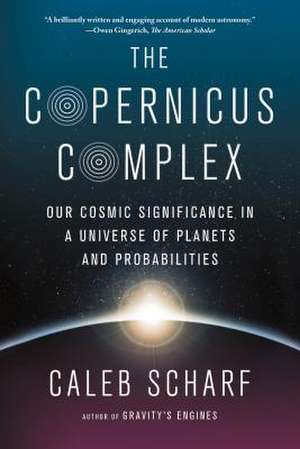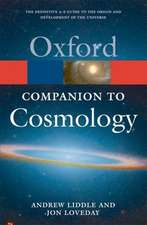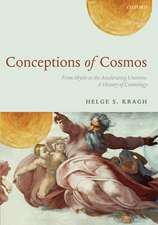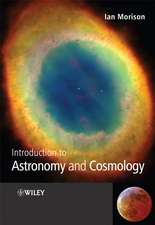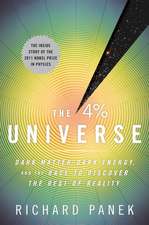The Copernicus Complex: Our Cosmic Significance in a Universe of Planets and Probabilities
Autor Caleb Scharfen Limba Engleză Paperback – 9 noi 2015
Longlisted for the 2015 PEN/E.O. Wilson Literary Science Writing Award
Short-listed for "Physics World"'s Book of the Year
"The Sunday Times (UK) Best Science Book of 2014"
""A "Publishers Weekly" Top 10 Science Book of Fall 2014
An NBC News Top Science and Tech Book of 2014
A Politics & Prose 2014 Staff Pick
In the sixteenth century, Nicolaus Copernicus dared to go against the establishment by proposing that Earth rotates around the Sun. Having demoted Earth from its unique position in the cosmos to one of mediocrity, Copernicus set in motion a revolution in scientific thought. This perspective has influenced our thinking for centuries. However, recent evidence challenges the Copernican Principle, hinting that we do in fact live in a special place, at a special time, as the product of a chain of unlikely events. But can we be significant if the Sun is still just one of a billion trillion stars in the observable universe? And what if our universe is just one of a multitude of others-a single slice of an infinity of parallel realities?
In "The Copernicus Complex," the renowned astrophysicist Caleb Scharf takes us on a scientific adventure, from tiny microbes within the Earth to distant exoplanets, probability theory, and beyond, arguing that there is a solution to this contradiction, a third way of viewing our place in the cosmos, if we weigh the evidence properly. As Scharf explains, we do occupy an unusual time in a 14-billion-year-old universe, in a somewhat unusual type of solar system surrounded by an ocean of unimaginable planetary diversity: hot Jupiters with orbits of less than a day, planet-size rocks spinning around dead stars, and a wealth of alien super-Earths. Yet life here is built from the most common chemistry in the universe, and we are a snapshot taken from billions of years of biological evolution. Bringing us to the cutting edge of scientific discovery, Scharf shows how the answers to fundamental questions of existence will come from embracing the peculiarity of our circumstance without denying the Copernican vision.
With characteristic verve, Scharf uses the latest scientific findings to reconsider where we stand in the balance between cosmic significance and mediocrity, order and chaos. Presenting a compelling and bold view of our true status, "The Copernicus Complex" proposes a way forward in the ultimate quest: determining life's abundance, not just across this universe but across all realities.
| Toate formatele și edițiile | Preț | Express |
|---|---|---|
| Paperback (2) | 95.70 lei 43-57 zile | +8.76 lei 6-12 zile |
| Penguin Books – 9 noi 2015 | 100.07 lei 22-36 zile | +8.76 lei 6-12 zile |
| Scientific American – 9 noi 2015 | 95.70 lei 43-57 zile |
Preț: 95.70 lei
Nou
18.32€ • 19.90$ • 15.40£
Carte tipărită la comandă
Livrare economică 21 aprilie-05 mai
Specificații
ISBN-10: 0374535574
Pagini: 288
Dimensiuni: 140 x 208 x 18 mm
Greutate: 0.23 kg
Editura: Scientific American
Notă biografică
Recenzii
The Copernicus Complexdelivers its argument with comparable clarity, insight and humour. There is much to enjoy along the way, including a compelling account of the extraordinary diversity of planetary systems we now know to exist
The Copernicus Complexaddresses a perennial mystery: the cosmic significance (or perhaps the insignificance) of life on Earth. Caleb Scharf summarizes current debates on how life began and how pervasive it is, explaining how our perspective has been changed by the recent discovery that there are millions of Earth-like planets in the Milky Way. He sets his theme in a historical context, writing in an engaging and accessible style
A tantalising approach to the mysteries of the universe
[A] witty, adroitly marshalled treatise on human significance
An intoxicating collection of questions answered with other questions, and startling discoveries that make creation even more mysterious . . . Books such as these remind us that we are lucky to be here at all, and even luckier to be here now
How reasonable is it to think that we are alone in the vast expanses of space? And how significant is life on Earth on the Universal (or multiversal) scale? These are the questions that astrobiologist Caleb Scharf addresses intelligently and comprehensively in his beautifully writtenThe Copernicus Complex
